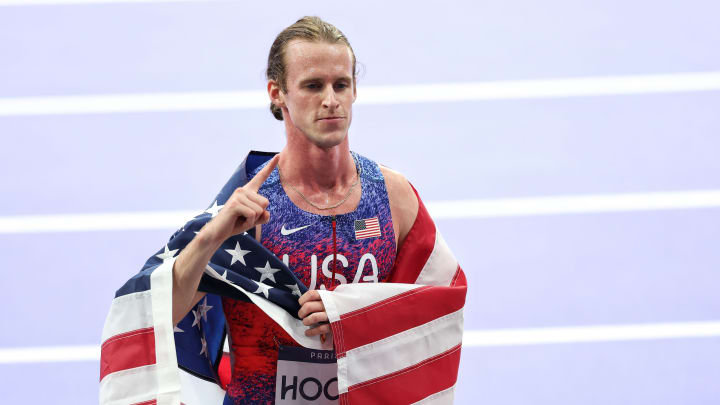Cole Hocker Pulls Off an Olympic Shocker to Win Gold in the 1,500

PARIS — There is supposed to be one Olympic men’s 1,500-meter race every four years. But Tuesday night, there were 12: A different one in the mind of each man on the track at Stade de France.
In the moments before the race began, Norway’s Jakob Ingebrigtsen, the defending gold medalist, already saw himself as the winner. If confidence were cookies, Ingebrigtsen would weigh three thousand pounds. The 1,500 is a highly strategic race—long enough to require a well-thought-out plan, short enough that one miscalculation can ruin a race. Ingebrigtsen went out at a world-record pace—and the world record is 26 years old.
Ingebrigtsen’s chief rival, Great Britain’s Josh Kerr, was the runner who was least likely to be fazed by Ingebrigtsen’s fast start. Kerr won the 1,500 at the last two world championships and he already believed that Ingebrigtsen thinks he is better than he is. The two have played a verbal tennis match for years, with the Norwegian serving and the Brit returning. Ingebrigtsen, after losing a 2-miler: “I would have beaten him in that race blindfolded.” Kerr, to the Guardian: “I’ll always have respect for his performances. I was merely pointing out that he has flaws, and I don’t think he knew that.”

Then there was American Cole Hocker. He knew people expected an Ingebrigtsen–Kerr duel: “I think the headlines were about them, rightfully so,” he said later. “It’s Olympic champion and world champion. The headlines made sense. “ But the thing you have to remember about Olympic races is that they bring together every athlete who was a dominant performer growing up, and they all still see themselves that way. Hocker has believed in his finishing kick since before he hit puberty. As he entered Stade de France for the final, he still believed in that kick. He just had to make it matter.
Ingebrigtsen tried to go wire-to-wire. He led the race at 1,200 meters, with 2021 silver medalist Timothy Cheruiyot right with him, and then Ingebrigtsen faltered. Kerr was not surprised: “It’s a hard way to run a 1.500. It’s risky. He obviously [ran] very well in ‘21 to get the gold medal, but since then, it’s not worked very well.”
Kerr passed Ingebrigtsen.
But then Hocker passed Kerr.
The race in Hocker’s mind was the one unfolding on the track. His thoughts, he said later: “I’m gonna be an Olympic medalist … let’s get silver … let’s get gold. With 20 meters to go, I feel like I knew I had gold.”
Hocker won it in 3:27.65, an Olympic record. American Yared Nuguse passed Ingebrigtsen to win bronze.
“I had a few ideas of how it could pan out in my head,” Nuguse said afterward. “This wasn’t one of them.”

Ingebrigtsen acknowledged that he miscalculated. Cheriyuot also miscalculated—he expended so much energy keeping up with Ingebrigtsen that he faded all the way to 11th. Kerr said his silver was “bittersweet.” He was proud but disappointed. He lost the race, but his view of it was validated.
After Hocker and Nuguse said they were surprised that Ingebrigsten missed the podium, Kerr said: “I would say I was less surprised, personally.” Kerr always believed this would be a race among 12 incredible runners, rather than a duel between two. He was right about the race. But Hocker was right about his kick.
“I’ve always kind of had a good finish, most of my running career, back to grade school,” Hocker said. “I’m definitely still searching for the words to describe that moment. Every part of me knew that this was the Olympic final, if that makes sense. I felt the moment. I felt the magnitude.”
Kerr felt him on his hip. He just could not hold him off.
“I got beat by the better man today,” Kerr said. “That was a heck of a race, and that’s what was promised.”

Michael Rosenberg is a senior writer for Sports Illustrated, covering any and all sports. He writes columns, profiles and investigative stories and has covered almost every major sporting event. He joined SI in 2012 after working at the Detroit Free Press for 13 years, eight of them as a columnist. Rosenberg is the author of "War As They Knew It: Woody Hayes, Bo Schembechler and America in a Time of Unrest." Several of his stories also have been published in collections of the year's best sportswriting. He is married with three children.
Follow rosenberg_mike